Inside Istanbul’s booming hair-transplant industry.
EsteWorld is an institution. The cosmetic surgery mammoth has three specialized hospitals that perform operations ranging from hair, mustache and beard transplantation, to Botox, cosmetic surgery and dental whitening. EsteWorld clinic in Uskudar, a suburban neighborhood on Istanbul’s Asian side, houses a café that also serves as a waiting area. Inside, luggage sits in a corner next to a group of striking veiled women and their Michael Kors shopping bags. There is nothing surgical about the clinic. Instead, the compound is more reminiscent of a cosmetic surgery fairyland, where bald men magically walk out with newly implanted hair and women walk out with larger breasts.
If EsteWorld is a kind of Disneyland, it is thanks to Turkey’s status as a leading destination for health tourism. Last year alone, more than half a million tourists came to Turkey to enjoy the sights and book a doctor’s appointment. High-quality services at low prices attract people from Saudi Arabia to the U.S. looking for hair transplantation surgery.
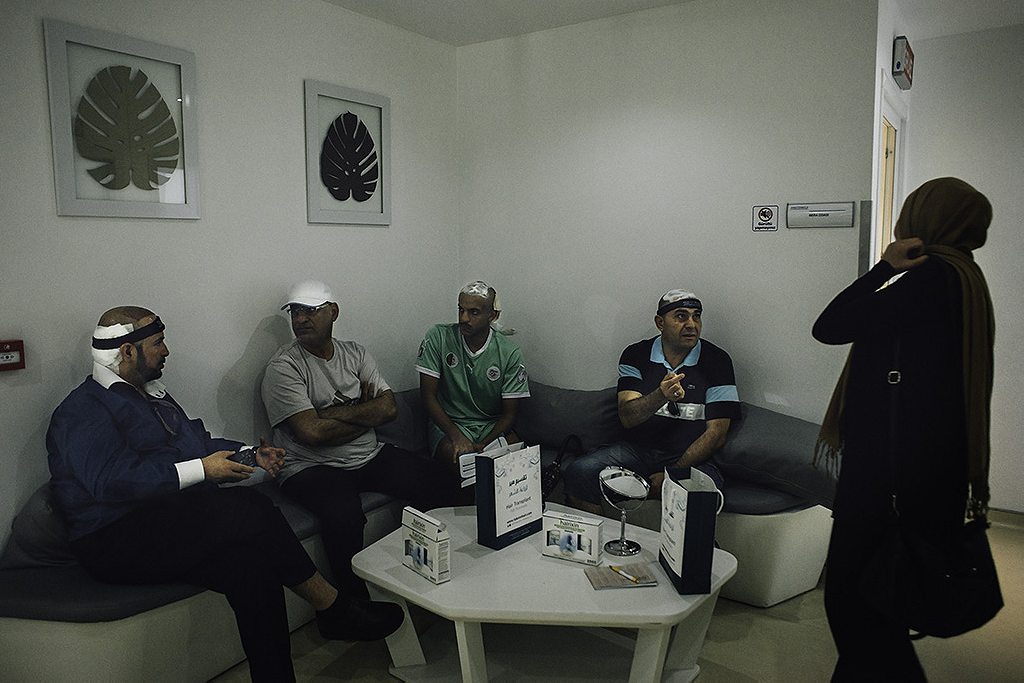
Istiklal Street is Istanbul´s lifeline, connecting Taksim Square, a symbol of the modern Turkish Republic, with the Bosphorus River. On any given day, around three million people walk down Istiklal Street, and it is a prime destination for the hordes of men fresh out of hair transplant surgery. Their appearance is disconcerting, especially when they walk together in groups. A large bandage covers their lower scalp, held in place by a black bandana. Their scarlet patches of raw pores and dried blood are disturbing, but the men are not deterred from sightseeing.
Do you know what a house without a roof feels like?
Abdul, a 35-year-old German tourist of Turkish descent, is one of them. He walks up Istiklal Street from Galata Tower on a cloudy Sunday afternoon. As he stops to ask a man for directions, his newly implanted hair is protected by a black bucket hat, courtesy of Estepera, which kindly abstained from placing their logo on the front of the hat. However, Abdul still stands out.
“Do you know what a house without a roof feels like?” he asks. “Cold in the winter and hot in the summer.” This is why Abdul paid about $1600 for 4,050 grafts of implanted hair. “[Hair transplants] are not only about aesthetics,” he says. “I got tired of hot summers and cold winters.” Abdul heard about Estepera through word-of-mouth. “Clinics pay thousands of dollars to advertise on the Turkish TV channels in Germany,” he says. He says he originally visited EsteWorld, but left after learning he would have to pay more than $2700 to fix his roofless house.
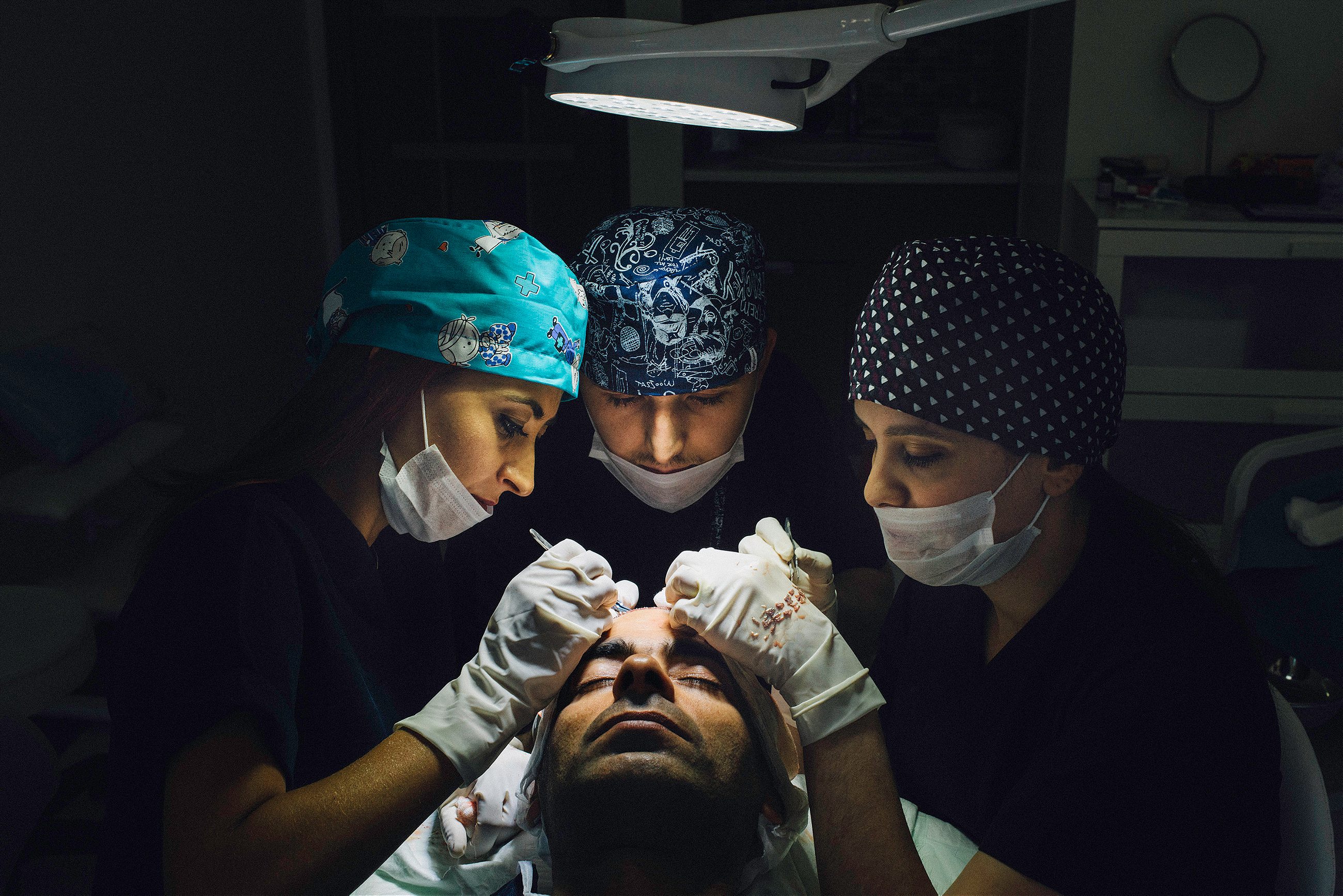
Hair transplantation in Turkey is considerably cheaper than in the West. In Canada, the procedure can range from $1500 to $4000, and prices can go up to $20,000. “It is not that cheap,” says Abdul. Even the shampoos offered in some clinics can be up to $70. Furthermore, the thousands of dollars patients pay don’t make hair transplantation a sure bet. A patient’s body can reject the transplanted hair, requiring subsequent surgeries. An Egyptian man, strolling with his wife and another couple, came to Turkey for his second surgery. “I would do it [hair transplantation] again and again,” said the Egyptian man in the English accent characteristic of Cairo’s elite.
Dr. Ersel Yazan has been working in the health transplantation sector for 12 years. He opened his own clinic—Dr. Hair Clinic—a month ago in Besikas, a wealthy neighborhood on the European side of Istanbul. He is used to receiving about 60 to 100 patients per month, especially during the winter season, the industry’s peak season. Patients can’t expose their newly implanted hair to the sun in the first month after the operation and are encouraged to get the treatment done in the fall or winter. Yazan has been invited to perform hair transplant operations in Holland, Iraq, Azerbaijan, and Germany. “My goal now is to tap into the Saudi market,” he says.
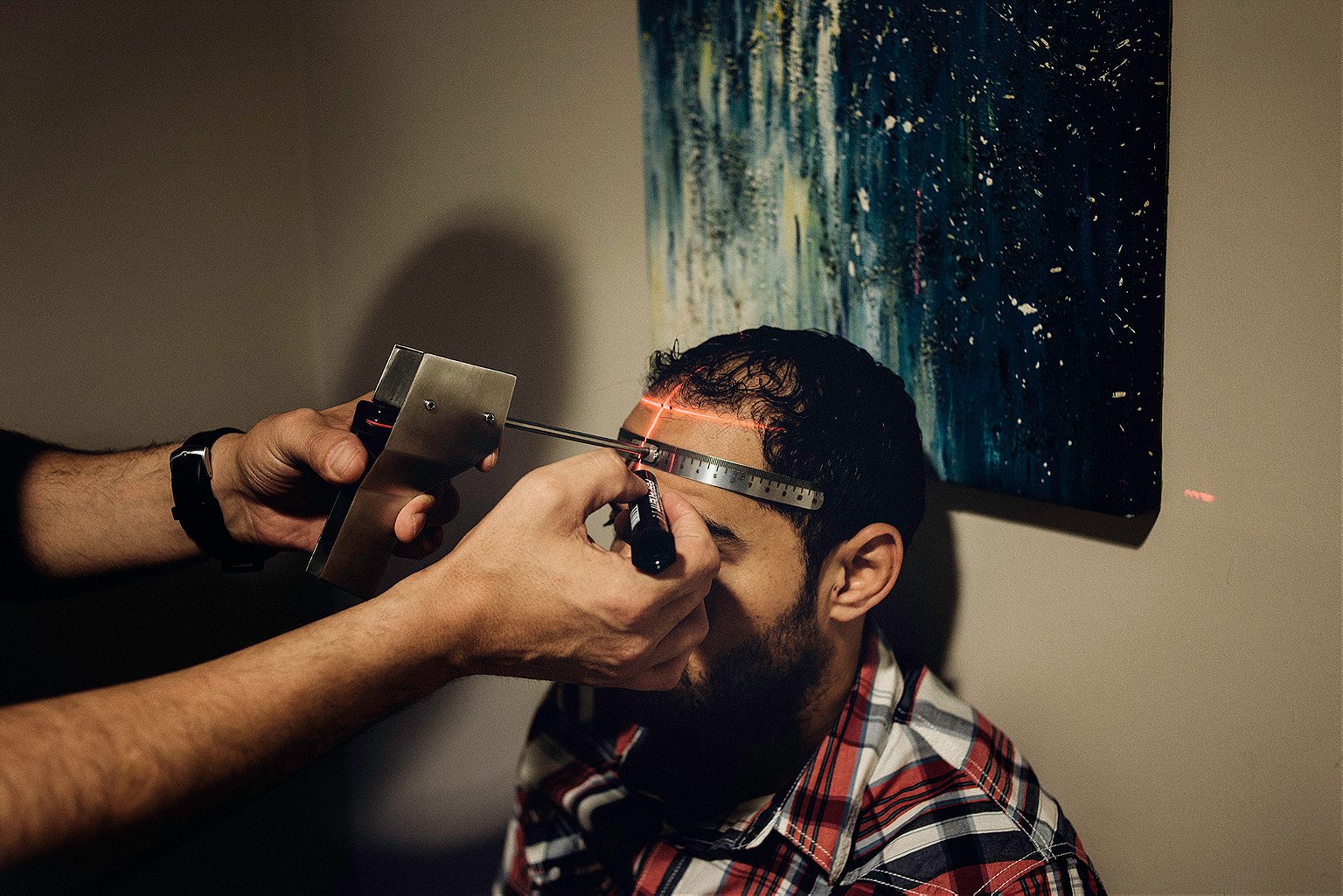
The market is highly competitive, especially for small- and middle-sized clinics like Yazan’s, but he is confident. His clinic has two operating rooms, an advantage over competitors who must rent a room in a hospital for about 1000 Turkish lira—$353—per patient, in order to perform the procedure. “I pay around $20,000 a month to advertise abroad,” he says. “And from that, I make about $100,000 in revenues.” Only 25 percent of his clientele is Turkish, so he doesn’t invest in advertising at home.
“Men are coming for other treatments like Botox, liposuction, and fillers,” says Dr. Yeliz Parlatici of Sky Hair Clinic. “They are taking care of themselves.” She also says it’s not just the wealthy who are flocking to the clinics. “Some of them ask for prices and come back a year later after they have saved money.”
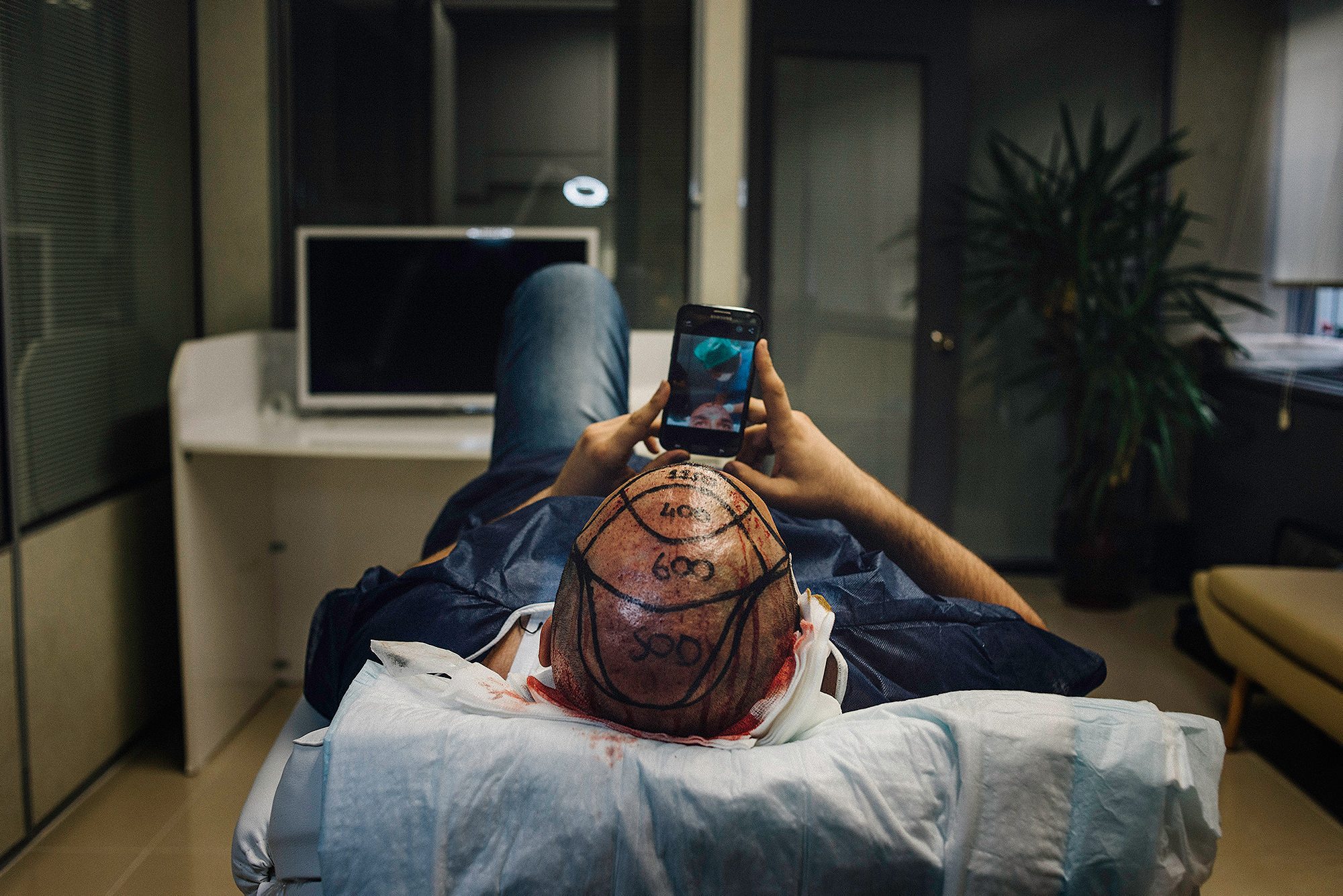
Turkey’s tourism industry works hand in hand with the private healthcare sector to make the country attractive to health tourists. Tourism agencies and hotels partner with the clinics to offer enticing three-day travel packages, including airport pick-ups, five-star hotels, and transportation. And agencies offer patient-to-clinic matchups. “About 95 percent of hair transplant clinics work with agents,” says Parlatici.
These agents help patients navigate the hair transplant world and provide clinics with the opportunity to distinguish themselves. Khawla is a 37-year-old Syrian woman who has worked in the hair transplant industry for two years. Syrian refugees in Turkey have found a niche within the industry as interpreters and “agents” for Arab patients. Khawla fled Damascus three years ago, leaving behind her former life and a career as an electrical engineer. She met her Turkish husband in a hair transplantation clinic. “He has had two surgeries,” she says.
Over coffee, she takes out her smartphone and scrolls through a long stream of bald heads until she reaches a picture of her husband. “Patients send me one picture every month for a year to show me their progress,” she says. It is men and women like Khawla who form the primary connection patients have with the clinics. After the surgery, patients stay in touch with Khawla through WhatsApp and other messaging services.
Khawla, a freelance agent, gets up to five patients per month, a small number in comparison to huge clinics such as EsteWorld. Once a patient buys a plane ticket, she arranges to pick him up from the airport and stays next to him during the nine-hour surgery, assisting the patient with Arabic translation. She secures mostly wealthy men from Saudi Arabia, but her customers have also come from Palestine, Kuwait, and Lebanon. She offers packages ranging from $1500 to $1950, for which she gets a $300 to $500 commission. Still, she says, her salary barely covers her household expenses. The commissions help support her husband, sister, nephews, and brother.
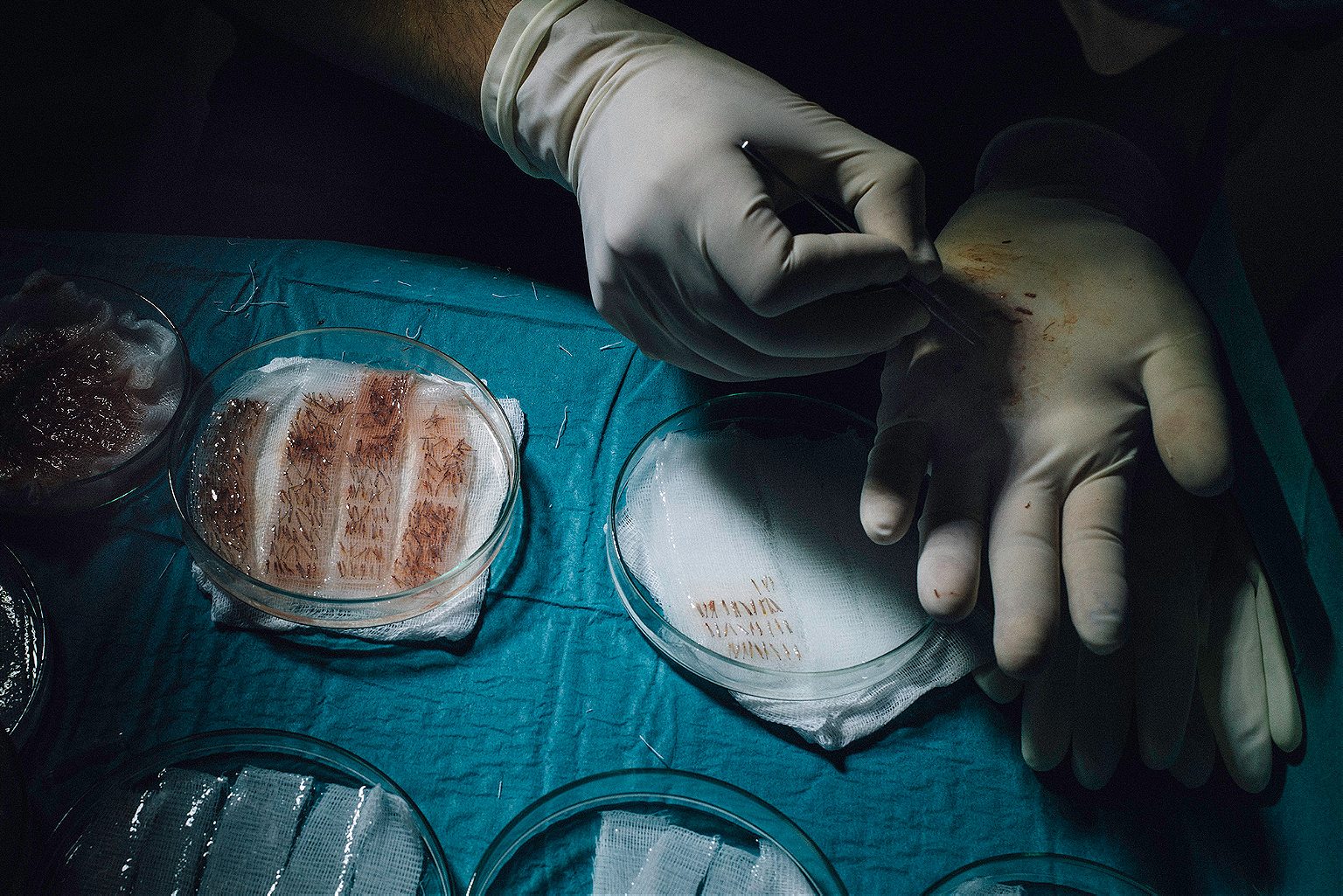
Ruaa, a 19-year-old who is also from Damascus, scored a job in a clinic due to her English, Arabic, and Turkish language skills. Sitting in a café in Avcilar, a satellite suburb in the outskirts of Istanbul, she says the clinics are deceptive. “The nurses are not certified to perform hair transplant procedures,” she says. She also says that patients are often misled about the number of sessions required to get their desired results. “Some need two sessions to fill all of their bald area but we don’t tell them until after the first session,” she confides.
Clinics pride themselves on their medical professionalism, but it is lightly trained women like Ruaa and Khawla who actually plan the procedure using pictures sent by the patients. “We used a sheet with different degrees of baldness as our guide,” she says, sounding slightly appalled. In Turkey, as in the U.S., any licensed physician can legally perform the surgery without prior surgical training of accreditation. Every hair transplant clinic is run by a doctor working with a team of specialists who perform the operations. “All our nurses receive a six-month training,” says Parlatici of Sky Hair Clinic.
Ruaa’s clinic charged Arab patients up to $3000, with a slightly higher rate for European patients. She worked 10 hours a day, six days a week, for 2300 Turkish lira, about $800 per week. International calls to contact clients abroad were deducted from her salary.
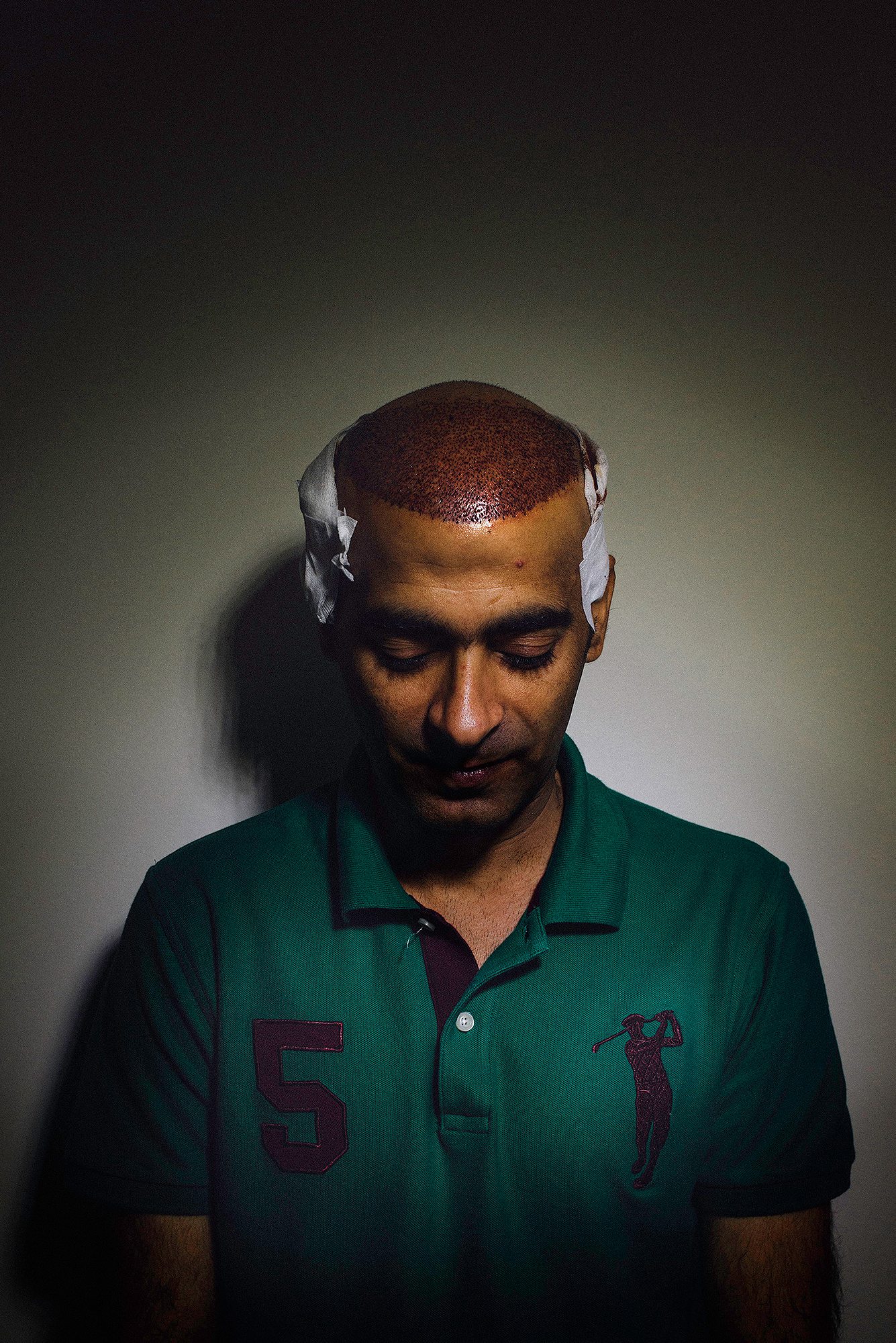
The impact of Turkey’s security situation, however, has taken a toll on the otherwise booming industry. On March 19, the latest suicide bomber attack took place in Istanbul’s Istiklal Street, the fourth attack this year. On April 27, a suicide bomber blew herself up in the popular tourist town of Bursa. Tourism fell 10 percent in February compared to last year, and government officials have tightened security measures in crowded areas and public transportation hubs to appease tourists and Turkish citizens. Armed policemen and convoys patrol the streets alongside men with gory, sensitive scalps.
However, the desire for a full head of hair remains strong. Khawla’s husband is having his third hair transplant surgery in August. The operation is a considerable investment for the young couple, but she’s going along with it. “He won’t be relaxed until he gets it,” she says.